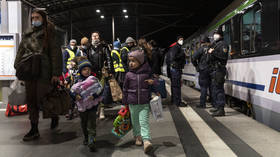German towns struggle to accommodate Ukrainian refugees – media

“Chaotic, unfairly distributed, funding completely unclear” – these words encapsulate the current situation in many German towns, which have been facing an ever-growing influx of Ukrainian refugees in recent weeks, the mayor of Dormagen am Rhein told Suddeutsche Zeitung newspaper on Thursday.
Erik Lierenfeld described how his town recently had to accommodate 34 Ukrainian refugees at short notice, most of them physically or mentally challenged children. Local authorities had to urgently repurpose an old school, erecting partition walls, taping windows to ensure a little bit of privacy for the newcomers, and bringing in hospital beds.
Dormagen has reportedly received no assistance from Germany’s federal government, being forced to fend for itself as well as it could.
Lierenfeld told the outlet that his town of 65,000 residents had also had to order container toilets, costing some €35,000 ($38,625) each.
The latest arrivals have brought the total number of Ukrainian refugees in Dormagen to more than 300. However, the mayor expects even more people to arrive in the coming days as metropolises like Cologne have no more beds.
The case of Dormagen is apparently not unique, as Suddeutsche Zeitung reports. According to the paper, local authorities in many German towns “feel forsaken by the federal government.”
The outlet estimates that approximately 15,000 Ukrainians arrive in Germany each day, on top of the 175,000 refugees officially in the country already.
German Interior Minister Nancy Faeser has been under fire recently, with mayors and opposition MPs arguing that the federal official should have done a better job distributing refugees across the country.
Faeser has parried criticism by saying that the legal status of Ukrainians in Germany, who are holders of biometric passports, is different from that of Syrians in 2015. For example, they can freely move across Germany, and in fact the whole of the Schengen area, without a visa for three months.
So, unlike Middle Eastern refugees, Ukrainians can choose where to settle, not being bound to any particular holding facility. It is only when newcomers apply for state benefits, the minister explained, that they are registered in Germany. According to Faeser, this lack of control, however, poses no security threat as the majority of refugees are women and children.
Some regional officials, however, have apparently been left unconvinced by those explanations and assurances.
Baden-Wurttemberg Interior Minister Thomas Strobl told Suddeutsche Zeitung that he expected the “federal government to become more active.” According to Strobl, there needs to be a “German-wide coordination of aid and accommodation – which will cost money.”
The official did not agree with his colleague from the federal government that the lax control of newcomers was of little concern. Strobl called on the federal authorities to “urgently get more involved in the registration and security checks” of the Ukrainian refugees. The Baden-Wurttemberg minister warned that failure to do that could lead to extremists slipping under the radar.













